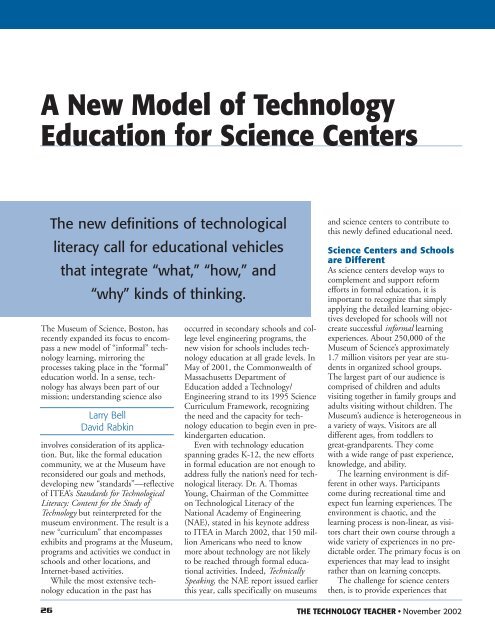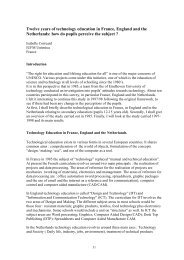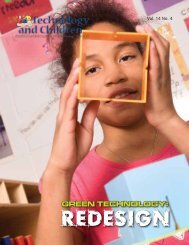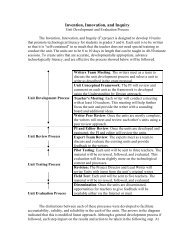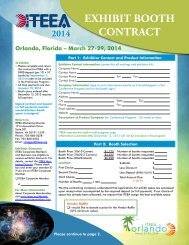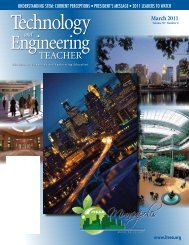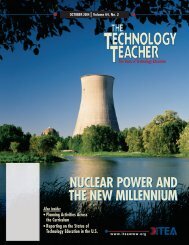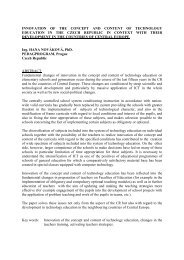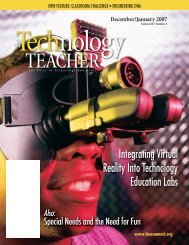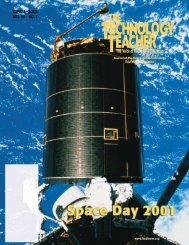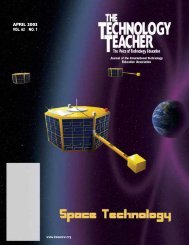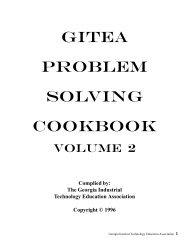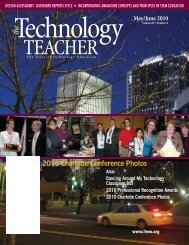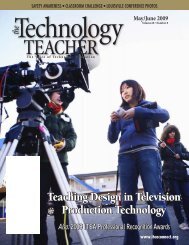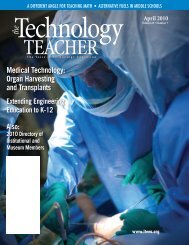A New Model of <strong>Technology</strong>Education for Science CentersThe new definitions of technologicalliteracy call for educational vehiclesthat integrate “what,” “how,” <strong>and</strong>“why” kinds of thinking.The Museum of Science, Boston, hasrecently exp<strong>and</strong>ed its focus to encompassa new model of “informal” technologylearning, mirroring theprocesses taking place in the “formal”education world. In a sense, technologyhas always been part of ourmission; underst<strong>and</strong>ing science alsoLarry BellDavid Rabkininvolves consideration of its application.But, like the formal educationcommunity, we at the Museum havereconsidered our goals <strong>and</strong> methods,developing new “st<strong>and</strong>ards”—reflectiveof ITEA’s St<strong>and</strong>ards for TechnologicalLiteracy: Content for the Study of<strong>Technology</strong> but reinterpreted for themuseum environment. The result is anew “curriculum” that encompassesexhibits <strong>and</strong> programs at the Museum,programs <strong>and</strong> activities we conduct inschools <strong>and</strong> other locations, <strong>and</strong>Internet-based activities.While the most extensive technologyeducation in the past hasoccurred in secondary schools <strong>and</strong> collegelevel engineering programs, thenew vision for schools includes technologyeducation at all grade levels. InMay of 2001, the Commonwealth ofMassachusetts Department ofEducation added a <strong>Technology</strong>/Engineering str<strong>and</strong> to its 1995 ScienceCurriculum Framework, recognizingthe need <strong>and</strong> the capacity for technologyeducation to begin even in prekindergarteneducation.Even with technology educationspanning grades K-12, the new effortsin formal education are not enough toaddress fully the nation’s need for technologicalliteracy. Dr. A. ThomasYoung, Chairman of the Committeeon Technological Literacy of theNational Academy of Engineering(NAE), stated in his keynote addressto ITEA in March <strong>2002</strong>, that 150 millionAmericans who need to knowmore about technology are not likelyto be reached through formal educationalactivities. Indeed, TechnicallySpeaking, the NAE report issued earlierthis year, calls specifically on museums<strong>and</strong> science centers to contribute tothis newly defined educational need.Science Centers <strong>and</strong> Schoolsare DifferentAs science centers develop ways tocomplement <strong>and</strong> support reformefforts in formal education, it isimportant to recognize that simplyapplying the detailed learning objectivesdeveloped for schools will notcreate successful informal learningexperiences. About 250,000 of theMuseum of Science’s approximately1.7 million visitors per year are studentsin organized school groups.The largest part of our audience iscomprised of children <strong>and</strong> adultsvisiting together in family groups <strong>and</strong>adults visiting without children. TheMuseum’s audience is heterogeneous ina variety of ways. Visitors are alldifferent ages, from toddlers togreat-gr<strong>and</strong>parents. They comewith a wide range of past experience,knowledge, <strong>and</strong> ability.The learning environment is differentin other ways. Participantscome during recreational time <strong>and</strong>expect fun learning experiences. Theenvironment is chaotic, <strong>and</strong> thelearning process is non-linear, as visitorschart their own course through awide variety of experiences in no predictableorder. The primary focus is onexperiences that may lead to insightrather than on learning concepts.The challenge for science centersthen, is to provide experiences that26THE TECH<strong>NO</strong>LOGY TEACHER • November <strong>2002</strong>
A NEW MODEL OF TECH<strong>NO</strong>LOGY EDUCATION FOR SCIENCE CENTERSsupport the core ideas of the st<strong>and</strong>ards,enhancing formal educational effortswith experiences that are adapted forthe special needs of our audience <strong>and</strong>the nature of the informal learningenvironment.Reinterpreting the St<strong>and</strong>ardsfor the Museum SettingIn the domain of science, our institutionhas adopted an educationalstrategy that gives visitors the opportunityto become interested in <strong>and</strong> learnabout science by exercising thethinking skills used by scientists—observation, classification, modeling<strong>and</strong> theory-building, testing, <strong>and</strong>analysis. What are the analogs in thedomain of technology—the corethinking skills, kinds of knowledge,<strong>and</strong> capabilities that will interestpeople in <strong>and</strong> help them cope withwhatever new technologies comealong? St<strong>and</strong>ards for TechnologicalLiteracy provides us with a core uponwhich to base our efforts:A technologically literate personunderst<strong>and</strong>s, in increasinglysophisticated ways that evolve overtime, what technology is, how it iscreated, <strong>and</strong> how it shapes society,<strong>and</strong> in turn is shaped by society.To do a good job at technologyeducation, a science center must showwhat technology is <strong>and</strong> what is goingon in technology today. It must provideh<strong>and</strong>s-on experience in design<strong>and</strong> engineering processes. It mustcreate a forum for discussion of thesocietal issues raised by technology.These three goals are mirrored in theNAE report, which argues that technologicalliteracy is comprised of...an underst<strong>and</strong>ing of the nature<strong>and</strong> history of technology, a basich<strong>and</strong>s-on capability related totechnology, <strong>and</strong> an ability to thinkcritically about technologicaldevelopment.This three-part definition of technologicalliteracy is the fundamentalconcept behind our plans to implementa new technology curriculum atthe Museum of Science.A New Model of <strong>Technology</strong>Education for Science CentersA 1986 Museum News article asking ifa science center should serve as a showplace,a playground, or a forum, gave uswords to use for our three-partconcept.In the broadest sense, Showcasethemes deal with “what” questions,Playground themes deal with “how”questions, <strong>and</strong> Forum themes dealwith ways to answer “why” or “whynot.” The new definitions of technologicalliteracy call for educationalvehicles that integrate “what,” “how,”<strong>and</strong> “why” kinds of thinking.The three parts of this new definitionof technological literacy have beenimplemented individually in variousscience centers throughout their history.However, they have been seen asalternative approaches rather thancomponents that are integrated into anoverall experience. Individually, thesealternative approaches have beenfound lacking in one way or another.While exhibitions that principallyWhat’s going on intechnology today?Whattechnology is.The effects of technologies onsociety, people, <strong>and</strong> the Earth.showcase technology may have educationalaspects to them, they often havebeen viewed as corporate promotions.While science center exhibits thatcreate a playground of learning experiencescan address important thinkingskills connected with engineeringdesign or the use of technology, theseexhibits often remove the real-worldcontext <strong>and</strong> consequences from theexperience. Finally, science centers creatingforums for discussion of societalissues raised by new technologies havefaced difficulties with an educationstaff used to the processes of sciencebut not the realms of values, ethics,<strong>and</strong> politics. These efforts have allfocused on one or another aspect ofthe three aspects of technological literacy.The new definitions of technologicalliteracy suggest the importanceof using a model that combines allthree, an approach that we haveadopted at the Museum of Science.Each aspect calls for differentapproaches in science centers. At theMuseum of Science, the Showcase willinclude exhibits that help visitors recognizethat technology is about creatinga product or process to meet aneed or solve a problem, <strong>and</strong> that it isall around us: many things are technology,not just computers. To addressHow technologies arecreated.How I can usetechnologies?Learning to make better decisions.November <strong>2002</strong> • THE TECH<strong>NO</strong>LOGY TEACHER27


